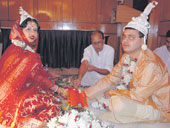 |
| SWEET SURRENDER: A file photo of Rajiv Bhattacharya’s wedding and (below) a still from the film, Runaway Bride |
The afternoon of February 8, 2006. A stunned silence descended on the matrimonial office of Relations, a private marriage brokerage company based in Calcutta. It had received what Anindya Sanyal, director of the agency, terms “yet another last-minute marriage cancellation phone call.”
Barely a week to go before the wedding, the bridegroom-to-be ? a 35-year-old employee of a private firm based in Delhi, who holds a senior position and is from a well-to-do Bengali family ? informed his family in Calcutta over the phone from Delhi that he just could not go through with the wedding. And he was in no mood to divulge the reason for it. His family called up Relations, which had fixed the match, to break the news. “It came as a blow to all of us at Relations,” says Sanyal, “because this match seemed to be ‘perfect’.” The 31-year-old bride-to-be, also from a well-to-do Bengali family, lived in London and worked for a British petroleum company.
“We had conveyed to her several proposals, but she was so sure of him that she immediately rejected the others,” says Sanyal, who set up Relations seven years ago. “The match was finalised and for months the two had kept in touch over the telephone. All preparations for the wedding were done. Invitation cards were sent. Gifts, jewellery and outfits had been bought. The girl had even resigned from her job in England ? quitting her job was one of the preconditions of the marriage. We were shocked to hear that he just called it off!”
Investigations by Relations’ Delhi office revealed that the groom-to-be was in a relationship with a 40-year-old widow. As he later confessed, he held back the truth initially because he didn’t want to hurt his family or his future bride-to-be.
Sanyal, who has been in the business of arranging marriages for over a decade, says that the incident mentioned above was the second of its kind in a span of just four months. And he agrees that “this is an indication of a definite rise in the number of people opting out of marriage at the eleventh hour.”
In recent times, some extreme cases have come to the fore ? men and women have actually concocted stories of or feigned their own kidnapping to cancel their weddings. In June 2005, a London-based IBM Global executive, Rajiv Bhattacharya, admitted to the police that he faked his own kidnapping to avoid an arranged marriage. He disappeared two days before the wedding, to reappear in faraway Mughalsarai, that too only after a massive manhunt was launched. His family even appealed to the chief minister to look into the case. The runaway groom went to the extent of inflicting injuries on himself to make the kidnapping story more believable. In February this year, a woman, riding pillion on her fiance’s bike, was supposedly ‘abducted’ by a group of men on a deserted road in Calcutta.
The following day, a team of investigators located her in a room on the outskirts of the city, having tea with a man, who later confessed that the two were married.
Nor is the trend limited to any particular country or applicable only to cases of ‘arranged’ matches. Last year, Jennifer Wilbanks, a bride-to-be from a small town in the US, claimed to have been kidnapped, only to change her story later. She admitted that she wanted to run away from her wedding.
According to a 2004 World Wide Web survey commissioned by a matrimonial website, “almost half of the individuals polled feared a runaway bride or groom.” David Blumenthal, a columnist who writes on matrimonial matters, commented recently that “besides bad weather, the biggest wedding day fear is a runaway bride or groom.” The phenomenon became the subject of a Hollywood feature film in 1999, Runaway Bride, starring Julia Roberts and Richard Gere.
Why do men and women, who are supposedly on the brink of what is considered to be one of the happiest phases of their lives, back out at the last moment? What compels them to take such drastic measures as feigning their own kidnapping?
The reasons, says Sanyal, range “from commitment phobia to being involved with someone else”.
“Marriage is considered to be one of the most important decisions of one’s life,” says Kurshid Anwar, a marriage counsellor, associated with a Calcutta-based counselling agency, Joytas. “While an ideal conjugal life is associated with happiness and fulfilment, a mismatch can have exactly the opposite effect. It is not unusual in an arranged marriage for either or both partners to feel apprehensive about whether they would be compatible or not. This fear becomes more and more intense as the date of the wedding approaches and this prompts backing out at the last moment. And often those who don’t have the courage to stand up to their families resort to desperate measures.”
But while marriage counsellors agree that pre-wedding jitters are perhaps as old as marriage itself, it is a fact that more and more such incidents are coming to the fore these days. Says Anwar, “Now people perceive that there are more opportunities and choices and they fear being committed to the ‘wrong choice’.”










